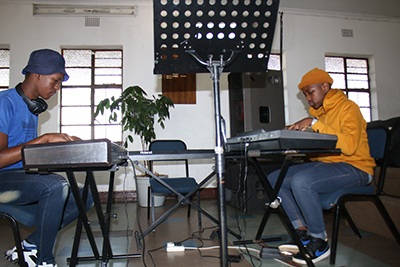News & Events
Celebrating youth: Using social media to grow your business
Social media marketing is a powerful way for businesses of all sizes to reach prospects and customers. Great marketing on social media can bring remarkable success to a business. This was the case for Hlamulo Ian Matlelema, a first-year student who is pursuing a diploma in Tourism Management.
Matlelema is the founder of Hlamulo Matlelema's Piano Lessons, a teaching centre based in Rockville, Soweto. The business was established on 10 April 2021, with the main purpose of offering piano lessons to help students become future virtuosos. Being an experienced pianist and musician, Matlelema serves the school as a piano teacher. To explain how the business came about, he said: “I founded my business after seeing a rise in the number of people wanting to learn how to play the piano, with many being unable to find professional piano teachers in Rockville or the neighbouring suburbs. Soon after establishing my business, I saw there was a huge demand amongst people living far from where I conduct my lessons to join the school, as word spread through social media that I offer professional lessons at an affordable rate.”

Hlamulo Matlelema's Piano Lessons
Given the word-of-mouth promotion and the social media referrals that Matlelema receives, he invest a great deal of effort in promoting his business on digital platforms such as Instagram and Facebook. “I currently teach five students and I comply with Covid-19 regulations, but my goal is to register more than 20 students by the end of the year,” he said. To achieve this, Matlelema has also opened a business account on Google, which helps him to reach more people outside Soweto, and which allow new students to access the location details of the music school.
Matlelema admits his studies at Unisa have contributed significantly to the successful running of his business. As he explained: “The modules that have immensely contributed and assisted me in running a successful business online, and at my physical location, are Business Management 1A and Entrepreneurial Skills. These subjects have equipped me with the tools to establish and operate a profitable business, and to ultimately become a successful entrepreneur who constantly seeks and discovers new ideas and ways of helping my business grow.”
Encouraging other students, Matlelema said: “My advice to other Unisans is that they should not quit, no matter how hard it gets. Running a business is not easy. You have to start small and work your way to the top. It might take longer than you anticipate for your business to start flourishing, but keep working hard until you see results. Be committed to your business, be willing to take calculated risks, maintain a positive attitude and approach, and, above all, persevere.”
Matlelema is on Facebook as Hlamulo Matlelema's Piano Lessons and on Instagram as mpianolessons. No matter what kind of business you manage, unless you take advantage of social media to promote it, you will be missing out on a fast, inexpensive, and effective way of reaching almost half the world’s population. Using social media for your business, no matter how small it is, is no longer optional – it offers essential platforms for reaching your customers, gaining valuable insights, and growing your brand.
*By Tshimangadzo Mphaphuli, Senior Journalist, Department of Institutional Advancement
Publish date: 2021/07/16
